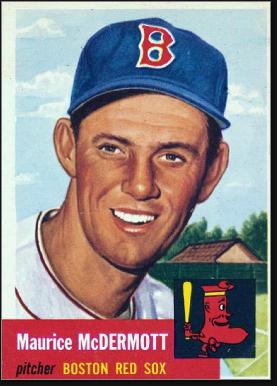
Sport: Baseball
Born: April 29, 1929
Died: August 7, 2003
Town: Elizabeth, New Jersey
Maurice Joseph McDermott was born April 29, 1929 in Poughkeepsie, NY. The McDermotts moved to Elizabeth, NJ when “Mickey” was in junior high and he joined the St. Patrick’s High School varsity. An extraordinary schoolboy athlete, he attended a tryout camp for the Dodgers at age 13 and scout Mule Haas wanted to ink him on the spot—only to find out that he was three years short of being eligible to sign. Instead, Mickey pitched semipro ball, often facing major leaguers playing under assumed names. His left arm was nothing short of electric.
Mickey was unhittable as a high-schooler for the Celtics. He once struck out 27 batters in a game. In 1944, Mickey’s father tweaked his birth certificate to make him 16 and he signed with the Red Sox for $5,000. Mickey was a strikeout machine in the minors, averaging almost a K per inning. The only thing keeping him from the majors was his inability to control his fastball—though he hurled a pair of no-hitters in the minors. Mickey made his Red Sox debut in 1948, but was sent back down in July. He threw his third minor-league no-hitter in 1949, earning a return ticket to Boston.
In Mickey’s second start after his recall, he twirled a three-hit shutout. He won four more times and pitched a second shutout, and was hailed as the next big thing in major league baseball. Mickey continued to progress over the next three seasons—leading the AL in K/IP in 1951 and 1952—but at times it was obvious he was enjoying his off-field celebrity a little too much. Finally, at the age of 24 in 1953, Mickey put it all together and went 18–10 with a 3.01 ERA. Like so many fastball artists, he found success when he took a little bit off his heater. He threw four shutouts and gave up the second-fewest hits per nine innings in the American League.
The stats, unfortunately, did not tell the complete story of Mickey’s 1953 season. In September, he punched a sportswriter and cursed in front of owner Tom Yawkey’s wife. That December, Mickey was exiled to the Washington Senators in a trade for another off-beat star, Jackie Jensen. Mickey turned in two decent years in the nation’s capital before a trade brought him back home, to the New York Yankees. He went 2–6 for the Bronx Bombers in 1956 and made one World Series appearance. He mopped up a one-sided Game 2 loss to the Brooklyn Dodgers, striking out Duke Snider twice and going 1-for-1 at the plate. Mickey’s stay in New York ended the following February, when he was part of a multi-player deal with the Kansas City A’s that brought back Bobby Shantz and Clete Boyer..
Mickey’s pitching continued to decline in KC. He was packaged with Billy Martin and a couple of other players to the Tigers after the 1957 season, but pitched all but two innings in the minors in 1958. Mickey tried to revive his career over the next few years without much luck. He pitched briefly in the majors again with the Cardinals and had a second go-round with the Athletics. The A’s released him in August 1961 after he walked six and threw a pair of wild pitches in a relief appearance.
Mickey pitched for three more years in the minors and worked odd jobs hoping to find his way back to the majors. He did, briefly—in 1969 as a batting practice pitcher for the Angels. Mickey scouted for the A’s in the late 1970s and early ’80s, and recommended a high-school slugger named Mark McGwire to the team. He worked as a player agent for a time, but his drinking led to the end of that career.
In 1991, just when he had hit rock bottom, Mickey won $7 million in the Arizona lottery. He sobered up and wrote his autobiography A Funny Thing Happened On the Way to Cooperstown. It was published in 2003, the same year he passed away from congestive heart failure.